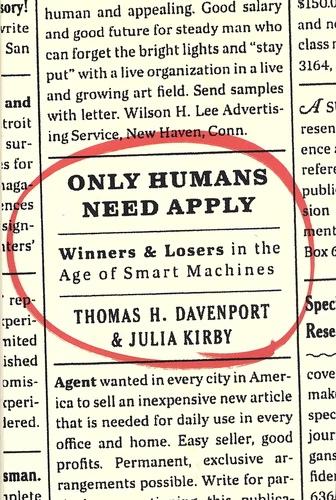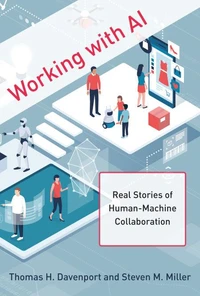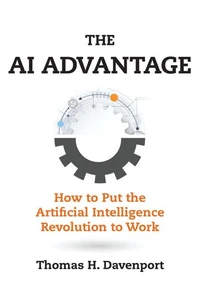Only Humans Need Apply. Winners and Losers in the Age of Smart Machines
Par : ,Formats :
Définitivement indisponible
Cet article ne peut plus être commandé sur notre site (ouvrage épuisé ou plus commercialisé). Il se peut néanmoins que l'éditeur imprime une nouvelle édition de cet ouvrage à l'avenir. Nous vous invitons donc à revenir périodiquement sur notre site.
- Paiement en ligne :
- Livraison à domicile ou en point Mondial Relay indisponible
- Retrait Click and Collect en magasin gratuit
- Réservation en ligne avec paiement en magasin :
- Indisponible pour réserver et payer en magasin
- Nombre de pages276
- PrésentationRelié
- FormatGrand Format
- Poids0.442 kg
- Dimensions16,2 cm × 23,6 cm × 3,0 cm
- ISBN978-0-06-243861-4
- EAN9780062438614
- Date de parution24/05/2016
- ÉditeurHarperBusiness
Résumé
Nearly half of all working Americans risk losing their jobs because of technology. It's not only blue-collar jobs at stake. Millions of educated "knowledge" workers - journalists, lawyers, doctors, marketers - are threatened by accelerating advances in artificial intelligence. The industrial revolution shifted workers from farms to factories. In the first era of automation, machines relieved humans of manually exhausting work.
Today Era Two of automation continues to wash across the entire services-based economy, replacing jobs in agriculture and manufacturing. Now Era Three, the rise of "cognitive computing," is dawning. Smart computers are demonstrating that they are capable of making better decisions than humans. Brilliant technologies can now learn, predict, decide, and even comprehend much faster and more accurately than the human brain, and their progress is accelerating.
Where will this leave financial advisors, scientists, teachers, and other professionals ? In Only Humans Need Apply, Thomas H. Davenport and Julia Kirby reframe the conversation about automation, arguing that the future of increased productivity and business success isn't either human or machine. It's both. The key is augmentation, utilizing technology to help humans work better, smarter, and faster.
Instead of viewing these machines as competitive interlopers, we must see them as partners and collaborators in creative problem solving as we move into the next era. The choice is ours.
Today Era Two of automation continues to wash across the entire services-based economy, replacing jobs in agriculture and manufacturing. Now Era Three, the rise of "cognitive computing," is dawning. Smart computers are demonstrating that they are capable of making better decisions than humans. Brilliant technologies can now learn, predict, decide, and even comprehend much faster and more accurately than the human brain, and their progress is accelerating.
Where will this leave financial advisors, scientists, teachers, and other professionals ? In Only Humans Need Apply, Thomas H. Davenport and Julia Kirby reframe the conversation about automation, arguing that the future of increased productivity and business success isn't either human or machine. It's both. The key is augmentation, utilizing technology to help humans work better, smarter, and faster.
Instead of viewing these machines as competitive interlopers, we must see them as partners and collaborators in creative problem solving as we move into the next era. The choice is ours.
Nearly half of all working Americans risk losing their jobs because of technology. It's not only blue-collar jobs at stake. Millions of educated "knowledge" workers - journalists, lawyers, doctors, marketers - are threatened by accelerating advances in artificial intelligence. The industrial revolution shifted workers from farms to factories. In the first era of automation, machines relieved humans of manually exhausting work.
Today Era Two of automation continues to wash across the entire services-based economy, replacing jobs in agriculture and manufacturing. Now Era Three, the rise of "cognitive computing," is dawning. Smart computers are demonstrating that they are capable of making better decisions than humans. Brilliant technologies can now learn, predict, decide, and even comprehend much faster and more accurately than the human brain, and their progress is accelerating.
Where will this leave financial advisors, scientists, teachers, and other professionals ? In Only Humans Need Apply, Thomas H. Davenport and Julia Kirby reframe the conversation about automation, arguing that the future of increased productivity and business success isn't either human or machine. It's both. The key is augmentation, utilizing technology to help humans work better, smarter, and faster.
Instead of viewing these machines as competitive interlopers, we must see them as partners and collaborators in creative problem solving as we move into the next era. The choice is ours.
Today Era Two of automation continues to wash across the entire services-based economy, replacing jobs in agriculture and manufacturing. Now Era Three, the rise of "cognitive computing," is dawning. Smart computers are demonstrating that they are capable of making better decisions than humans. Brilliant technologies can now learn, predict, decide, and even comprehend much faster and more accurately than the human brain, and their progress is accelerating.
Where will this leave financial advisors, scientists, teachers, and other professionals ? In Only Humans Need Apply, Thomas H. Davenport and Julia Kirby reframe the conversation about automation, arguing that the future of increased productivity and business success isn't either human or machine. It's both. The key is augmentation, utilizing technology to help humans work better, smarter, and faster.
Instead of viewing these machines as competitive interlopers, we must see them as partners and collaborators in creative problem solving as we move into the next era. The choice is ours.





